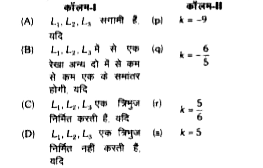यदि a2i+b2i+c2i=1,(i=1,2,3) और aiaj+bibj+cicj=0
(∈ej,i,j=1,2,3), तब ∣∣
∣∣a1a2a3b1b2b3c1c2c3∣∣
∣∣2 का मान है
0
1/2
1
2
The correct Answer is:C
Step by step video, text & image solution for यदि a_(i)^(2)+b_(i)^(2)+c_(i)^(2)=1,(i=1,2,3) और a_(i)a_(j)+b_(i)b_(j)+c_(i)c_(j)=0 (inej,i,j=1,2,3), तब |(a_(1),a_(2),a_(3)),(b_(1),b_(2),b_(3)),(c_(1),c_(2),c_(3))|^(2) का मान है by Maths experts to help you in doubts & scoring excellent marks in Class 12 exams.
Updated on:21/07/2023Topper's Solved these Questions
- सारणिक तथा आव्यूह Book:ERRORLESS HINDIChapter:सारणिक तथा आव्यूह Exercise:Solved Multiple Choice Questions ( आव्यूह के प्रकार, आव्यूह का बीजगणित)
Explore 130 Videos
- सारणिक तथा आव्यूह Book:ERRORLESS HINDIChapter:सारणिक तथा आव्यूह Exercise:EXERCISE
Explore 262 Videos
- सारणिक तथा आव्यूह Book:ERRORLESS HINDIChapter:सारणिक तथा आव्यूह Exercise:Solved Multiple Choice Questions (सारणिक का प्रसार , सारणिक के रूप में समीकरण का हल एवं सारणिक के गुणधर्म)
Explore 150 Videos
- सरल रेखा Book:ERRORLESS HINDIChapter:सरल रेखा Exercise:JEE ADVANCE (Matrix Match type questions)
Explore 4 Videos
Similar Questions
यदि M=[1223] और M2−λM−I2=0 तब λ=
View Solution∣∣ ∣ ∣∣111cos(nx)cos(n+1)xcos(n+2)xsin(nx)sin(n+1)xsin(n+2)x∣∣ ∣ ∣∣ निर्भर नहीं करता है
View Solution∣∣ ∣ ∣∣1aa2−bc1bb2−ac1cc2−ab∣∣ ∣ ∣∣=
View Solution
View SolutionIf x∈R,ai,bi,ci∈R for i=1,2,3 and ∣∣ ∣∣a1+b1xa1x+b1c1a2+b2xa2x+b2c2a3+b3xa3x+b3c3∣∣ ∣∣=0, then which of the following may be true ?
View SolutionGiven a2i+b2i+c2i=1,i=1,2,3andaiaj+bibj+cicj=0(i≠j,i,j=1,2,3), then the value of the determinant
∣∣ ∣∣a1a2a3b1b2b3c1c2c3∣∣ ∣∣, is
View SolutionStatement -1 Consider the determinant
Δ=∣∣ ∣ ∣∣a1+b1x2a1x2+b1c1a2+b2x2a2x2+b2c2a3+b3x2a3x2+b3c3∣∣ ∣ ∣∣=0,
where ai,bi,ci∈ R (i=1,2,3) and x∈ R
Stement -2 If ∣∣ ∣∣a1b2c3a2b2c2a3b3c3∣∣ ∣∣ =0, then Δ =0
View SolutionIf ∣∣ ∣∣a1b1c1a2b2c2a3b3c3∣∣ ∣∣=Δ, then ∣∣ ∣∣A1B1C1A2B2C2A3B3C3∣∣ ∣∣=
View SolutionShow that ∣∣ ∣∣a1b1−c1−a2−b2c2a3b3−c3∣∣ ∣∣=∣∣ ∣∣a1b1c1a2b2c2a3b3c3∣∣ ∣∣
View SolutionThe determinant
∣∣ ∣∣b1+c1c1+a1a1+b1b2+c2c2+a2a2+b2b3+c3c3+a3a3+b3∣∣ ∣∣
View SolutionIf Ai,Bi,Ci are the cofactors of ai,bi,ci respectively,i=1,2,3 in Δ=∣∣ ∣∣a1b2c1a2b2c2a3b3c3∣∣ ∣∣show that ∣∣ ∣∣A1B1C1A2B2C2A3B3C3∣∣ ∣∣=Δ0
View SolutionIf Ai,Bi,Ci are the cofactors of ai,bi,ci respectively,i=1,2,3 in Δ=∣∣ ∣∣a1b2c1a2b2c2a3b3c3∣∣ ∣∣show that ∣∣ ∣∣A1B1C1A2B2C2A3B3C3∣∣ ∣∣=Δ0
View SolutionIf A=∣∣ ∣∣a1b1c1a2b2c2a3b3c3∣∣ ∣∣andB=∣∣ ∣∣c1c2c3a1a2a3b1b2b3∣∣ ∣∣ then
View SolutionIf a=a1i+a2j+a3k,b=b1i+b2j+b3k,c=c1i+c2j+c3k,d=d1i+d2j+d3k and
k(a×b)×(c×d)=∣∣ ∣ ∣ ∣∣−a−bcda1b1c1d1a2b2c2d2a3b3c3d3∣∣ ∣ ∣ ∣∣
(formal expression) then
View SolutionIf x∈R,ai,bi,ci∈R for i=1,2,3 and ∣∣ ∣∣a1+b1xa1x+b1c1a2+b2xa2x+b2c2a3+b3xa3x+b3c3∣∣ ∣∣=0, then which of the following may be true ?
View Solution